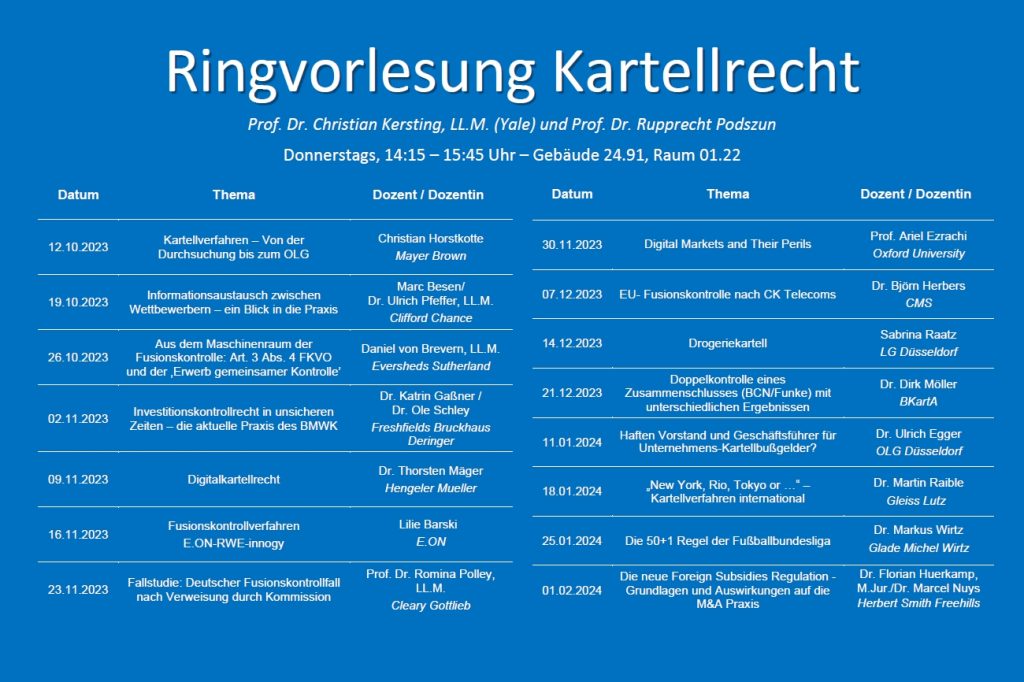
SSNIPpets (48): The latest of the latest
PDF-Version: Click here
Suggested Citation: Podszun, DKartJ 2023, 97-102
The 11th amendment to the German competition law act (GWB) has entered into force. The 12th amendment of the GWB is being prepared. Is GWB13 around the corner? We don’t have an answer to this question (which is not far-fetched) – but we do have the most important news of the week, compiled by Rupprecht Podszun.
The knot
We recently spoke to an observer of the antitrust scene in Germany who resides at Cologne, and he explained that his location is ideal: the authorities in Brussels and Bonn are close by, as is “the Düsseldorf knot” (in German: Der Düsseldorfer Knoten). That’s actually a good description: you’re almost always there in Cologne, that’s prihima (as they say there), but somehow Cologne is for competition law what Weeze Airport is for tourism in Düsseldorf: a far-away suburb. Of course, we don’t want to get into the competition with Cologne, but rather say something about the “Düsseldorf knot” here today. I’m going to reveal that right now: These SSNIPpets are shamelessly promoting the good cause again!
Before we get there, however, we must fulfil our duty as chroniclers and present the most important links of the week for all those who have left the increasingly anti-social networks.
Unbundling the knot
The 11th amendment to the GWB, including disgorgements of profits and the German “New Competition Tool” in § 32f, has now come into force. This marks the highly official start of the guesswork as to which unbundling order from the Bundeskartellamt will hit first – or at least some of the milder means, foreseen in § 32f…

We are betting, somewhat conservatively and boringly, on the waste disposal industry, which has been in the Bundeskartellamt’s sights for some time. Kim Manuel Künstner, a lawyer with Schulte Riesenkampff, has presented an expert opinion on behalf of Lobbycontrol, the NGO, according to which the Bundeskartellamt can divest Amazon’s business with the help of the new rule. The B2, the Bundeskartellamt’s unit for Amazon, nowadays led by Julia Topel, may take over!
Andreas Mundt, who is perhaps also a not entirely uninteresting source in this matter, recently commented very effusively on the sector inquiry by his Austrian colleagues from the Bundeswettbewerbsbehörde into food retailing and applauded it with an emoji. Says Mundt:
“Natalie Harsdorf-Borsch and team highlight the market situation in 🛒 food retail, where the parallels to Germany are obvious: A high concentration at retail level. According to the BWB, the big four retail chains in Austria have a combined market share of over 90 per cent. This is similar in Germany with Edeka, Rewe, Aldi and the Schwarz Group with Lidl. (…) For me, there is little reason to believe that the results in Germany would be much different.”
Andreas Mundt on LinkedIn, 4 November 2023
The four from the supermarket checkout had already rumbled fiercely against the GWB amendment via the Handelsverband. Nevertheless, mentioning Edeka and Rewe gives us reason to present the most beautiful November song we know. Alexander Kirk drew my attention to what the marvellous musician Thomas Pigor wrote six years ago – you can hear and see it here. That is an absolute treat for all fans of merger control (if you understand German)!
The relativity of simultaneity

Matthias Heider, who took care of competition policy for the CDU in the German Bundestag for a long time, once said: After the GWB amendment is before the GWB amendment. This so-called “Heider dictum” has now been effectively refuted. The idea of sequentiality that resonates in his sentence is being replaced by simultaneity in the current reform drive.
You have to imagine the competition department of the Federal Ministry of Economics as a Minkowski room. The physicist Hermann Minkowski developed this idea in a lecture, incidentally in Cologne (!). I can’t explain the Ministry-Minkowski in detail, but it has to do with the fact that space and time are relative and things happen simultaneously. In short: with the announcement of the entry into force of the 11th amendment to the GWB, the public consultation on the 12th amendment is now available.
In a multiple-choice questionnaire, the Ministry wants to know what you think of its work and what you think of various projects on the competition policy agenda. The topics covered are cartel damages, administrative powers in consumer protection, merger control & ministerial authorisation of mergers and, of course, sustainability. If this multiple-choice questionnaire reminds you of your driving licence test and you are worried that you will fail, we have something for you. The Düsseldorf Prep Package!
How not to fail the Ministry’s multiple choice
- You know that Alexander Kirk, Philipp Offergeld and Tristan Rohner have published an entire book in which they deal with “Competition Law at the Turning Point” and bring together contributions from outstanding authors who comment on and evaluate precisely this agenda. This book is available here, for example. In it, my colleague Christian Kersting takes a look at the various construction sites in damages law, for example.
- Speaking of cartel damages,
ice cream manufacturer andprolific judge Dr Gerhard Klumpe recently wrote here about ideas for reforming the law on damages, which Justus Haucap and I then discussed in our podcast “Bei Anruf Wettbewerb”. (This is what we call a cross-media campaign). If you want to cite Judge Klumpe’s contribution or other contributions to this blog seriously in the future (seriously – i.e. in your blog post, LinkedIn entry, in WuW/NZKart/ZWeR, in your doctoral thesis or in a written pleading) – then you can do so with the new DKartJ citation. You can find the DKartJ version of an article by clicking on it; if we have already entered it into our system, DKartJ is linked (take a look at this article on the 11th amendment to the GWB, for example). Or you can look directly at the current annual edition of DKartJ. Is the DKartJ a new competition law journal? No, it is just an attempt to arm ourselves against the eventuality that everything collapses here, which wouldn’t surprise us in any way. And then it would be a shame for the beautiful pieces that would have disappeared into the darknet. - A team from HHU led by Justus Haucap and myself has presented a comprehensive report on competition and sustainability, in which we explored options for the Ministry. The report is available online here.
- Back in 2018, together with Christoph Busch and Frauke Henning-Bodewig and with strong support from Gregor Schmieder, I drew up an expert report on consumer protection. Should the Bundeskartellamt be given powers in this field? Answers in English were published in EuCML 2019, 75, in German they are freely available, here.
Good for you! All you have to do is read and summarise. And what about us?
Of course, we try to stay on top of things. For example, we at the Düsseldorf Institute for Competition Law are currently working feverishly passionately on the new edition of the competition law commentary by Loewenheim/Meessen/Riesenkampff/Kersting/Meyer-Lindemann, which will have a slightly shorter name from the next edition onwards. The English-language and actually new version of our DMA commentary is also “in the making”. You can discover the many smaller contributions from our Institute in WuW, NZKart, SSRN or the Roman Herzog Institute’s “Impulse Spezial” issue.
Therapeutic effects of talking competition law

Eversheds partner Daniel von Brevern recently visited us for a therapeutic measure. He is, by his own admission, “obsessed” with Art. 3 (4) ECMR. His obsession revolves around full-function joint ventures, the acquisition of joint control, the ECJ decision Austria Asphalt (Case C-248/16) and its interpretation by the European Commission. In the meantime, von Brevern is even haunted by the idea that the Commission simply picks and chooses its merger cases as it pleases… largely undisturbed by judicial review.
We were able to help: He took part as a speaker in our lecture series on competition law, where he described these problems to our students in a captivating lecture with some self-irony. His promise: He will now abandon this topic, on which he has published a great deal, notify what needs to be notified and believe that merger control will hit the right cases. (Which may have to be proven by the 12th amendment to the GWB).
Why I mention this: Because I want to draw attention to our great lecture series, to which all interested parties are invited! Von Brevern’s lecture is just one example of the exciting insights into the engine rooms of antitrust. Speakers in the coming weeks include Lilie Barski (E.ON), Romina Polley (Cleary Gottlieb), Björn Herbers (CMS) and Sabrina Raatz (Düsseldorf Regional Court). We do not dare to predict whether their presentations will also have a healing effect on the speakers or the audience, but even if they do: You don’t need a prescription, it costs nothing, you are welcome. (Every Thursday, 2.15 pm, room 01.22 in the Faculty of Law – all speakers and topics under this link!)

However, we have to make a correction to the schedule right away: We have to postpone the afternoon with Dirk Möller from the Bundeskartellamt, which I was particularly looking forward to for old times’s sake and the hot topic. Möller is to speak about the Burda/Funke case – two giants of the traditional media world who were allowed to merge some activities and cooperate in marketing. Anyone who reads the clearance decision (e.g. here) will know that the Bundeskartellamt did not take the decision light-heartedly. If you want to hear more about this and don’t want to wait for the new date in the lecture series: The Düsseldorf Higher Regional Court has scheduled a hearing for 15 November 2023 at 11.00 am.
A guest from Oxford
We have a very special highlight in this semester’s lecture series. We have a new programme for visiting professors at the Faculty of Law at Heinrich Heine University, which enables us to invite a top-class guest every winter semester. As the Institute of Competition Law, we have the honour of kicking off the programme with Ariel Ezrachi, who will be coming to Düsseldorf for a number of events over the coming months. Ariel is the Slaughter and May Professor of Competition Law at the University of Oxford and Fellow at Pembroke College. (Our friend from Cologne would probably talk about the “Oxford knot” when he talks about locations for doing research).

Ezrachi is the Director of the Oxford Centre for Competition Law and Policy, but above all he is a driving force behind many current debates. His books, often co-authored with US economist Maurice Stucke, are regularly at the top of the bestselling lists (at least in the segment of gripping antitrust literature). “Virtual Competition” was the starting signal for the critical examination of Big Tech. Ezrachi has remained true to this in his new book “How Big-Tech Barons Smash Innovation”. In between was “Competition Overdose” with the disturbing thesis that there is such a thing as toxic competition. If you want to get to know Ezrachi, come to the lecture series on 30 November 2023 – his topic: “Digital Markets and Their Perils”.
Cultural intermezzo
Off topic: By the way, we have another event that very evening that already has me chirping and cheering: We are dragging eighty law students from our university to the Düsseldorf opera, to watch Mozart’s “Magic Flute” and to lower the average age to a record low infect them with the cultural virus. It has an angle to antitrust: Lawyer Christian Horstkotte (Mayer Brown) sponsors the interval drink (without which opera is not opera), just for the fun of it. That deserves a mention here!
Düsseldorf on tour
Because we were just talking about visiting professors: My institute colleague Christian Kersting, known from TV, radio and arbitration proceedings, did not take a holiday during the often so-called “semester break”, but was invited to other universities as a visiting professor. In September and October, Kersting travelled to Brazil. There he taught at the Fundação Getúlio Vargas Law SP in the metropolis of São Paulo, where he focussed on cartel damages, leniency and private enforcement.
His visiting professorship before that, in August, has taken on a completely different meaning in retrospect. Mr Kersting was at our partner faculty, the Harry Radzyner Law School, which belongs to Reichman University in Herzliya, Israel. In addition to teaching on private enforcement in European antitrust law with around 50 highly motivated Israeli students, the programme also included a wide range of discussions with colleagues from the Radzyner School. The cooperation and friendship between our two faculties is of particular importance to us. In times of terror against Israel, we feel this bond particularly strongly. The events come very close when Christian reports on the news from the professors with whom he was just walking cheerfully across the campus, or when students who took part in our exchange seminar with Herzliya show us Instagram photos of their partner students, who were in Düsseldorf for the seminar just a few months ago, in combat uniform.
Written in stone – the Diss-List

Change of subject, even if it’s hard. New PhD theses have been published by students who were supervised by Christian or me. They are highly recommend, of course!
- Jörn Kramer has published his dissertation entitled “Die vertragliche Pauschalierung von Kartellschäden: zugleich eine Untersuchung zur gesamtschuldnerischen Haftung der Kartellbeteiligten” (Mohr Siebeck 2023). This one deals with damages and lump sums, and also the joint responsibility of cartelists.
- Julian Urban has written about “Plattformbasierte Ökosysteme im Kartellrecht” (Nomos 2023), i.e. digital ecosystems, a topic that is on the minds of many observers of the digital economy.
- In an empirically based study, Nils Overhoff has addressed the question of whether the second (third, fourth) chance repeatedly granted to insolvent companies under German insolvency rules is actually compatible with the idea of competition protection (“Wettbewerbsschutz und die Unternehmenssanierung in der Insolvenz”, Nomos 2023).
As you know, all PhD dissertations (and habilitations) on competition law since 2016 belong into the Diss List on this page. Works that are not listed there only exist in a twilight, as if they were on a bookshelf in the second row, hidden behind several volumes of Areeda’s and Hovenkamp’s Antitrust Treatise. Please send your entries for the Diss-List to our team!
No advertising here
(“Phew, that was a really long commercial in this blog”, says an exhausted law firm partner to the associate he likes to have next to him when reading the SSNIPpets, because then he still has a listener for his commentary on the SSNIPpets, while the associate would actually like to fill out the latest RFI. With every minute that passes, the associate sees the date with her new boyfriend trickling away, and she wanted to show him “The Informant” tonight, to explain to him what she does on the job. “Sometimes I get the impression,” says the lawyer, “that SSNIPpets on D’Kart is a permanent advertising programme, just like it used to be on telly. Do you remember that? When I was writing my exams, I used to watch the Wok World Cup with Stefan Raab to distract myself, it’s crazy how long ago that was, it always said “permanent advertising programme” [Dauerwerbesendung] on the TV, right in the upper left corner. Do you still know Stefan Raab? Is he known in your generation? Very big, he was a giant of entertainment, there is no one like him today. Does the Wok World Cup still exist?” – The associate is about to answer, but it’s already going on…)
Stayin’ alive stayte aid
If you still need a “long read” for the weekend, I have something for you that came to my attention through a remarkable tweet. The text in question is from the Financial Times (to be found here). Content (very roughly): The EU is jeopardising its potential by failing to adequately protect the single market, the idea that is actually the basis of the entire European project. The internal market is at risk above all due to the fierce subsidy policy that has taken hold in recent years. According to the FT, the Commission approved subsidies totalling €733 billion between March 2022 and August 2023. “Brussels threw the economic rulebook into the fire”, the text reads. In this rulebook, just a reminder for all those who have not yet leafed through more than Art. 106 TFEU, Art. 107 para. 1 TFEU reads:
“Save as otherwise provided in the Treaties, any aid granted by a Member State or through State resources in any form whatsoever which distorts or threatens to distort competition by favouring certain undertakings or the production of certain goods shall, in so far as it affects trade between Member States, be incompatible with the internal market.” (emphasis added here only)
Since the pandemic, state aid is stayin’ alive… Only the wealthy EU Member States, or those who think they are, can afford such expenditure. The result is a distortion of competition in the EU.
The text from the Financial Times did not fail to mention that the problem has been recognised by the European Council. Enrico Letta, former Italian Prime Minister and head of the Jacques Delors Institute think tank alongside Pascal Lamy, has been tasked with presenting a report.
The remarkable thing is the following: Benoît Cœuré, President of the French antitrust authority Autorité de la Concurrence, recommended the text in a post. Eh ben, I thought, c’est intéressant. After all, many competition advocates in Europe are trembling at the prospect of a strengthened French commissioner who may want to boost his home industry with a lot of state money. Perhaps he has an opponent in his valiant compatriot Cœuré.
AC (DC)
The last news item for today comes from a post by Christian Bergqvist, professor of competition law in Copenhagen. As we already know, Denmark suffered for 16 years from the market division that 22 nightclubs had undertaken. Now this:
Ecit Account A/S har overtrådt konkurrenceloven ved som rådgiver at være med til at etablere og opretholde et kartel, hvor en række selvstændige diskoteker og deres indkøbsselskab delte markedet imellem sig.
Of course that’s a great thing: there was a cartel facilitator in the disco cartel who is now also to be fined. No, it wasn’t AC-Treuhand. But this Danish is a nice language, isn’t it? Can you sing in it? Yes, it sounds something like this. “Skarpty lys” by Gilli was the hit of the last few weeks in Denmark. For a translation of the surely very clairvoyant lyrics, please contact an EU competition commissioner you trust.
Have a nice weekend!
Prof Dr Rupprecht Podszun is a Director of the Institute for Competition Law at Heinrich Heine University Düsseldorf.